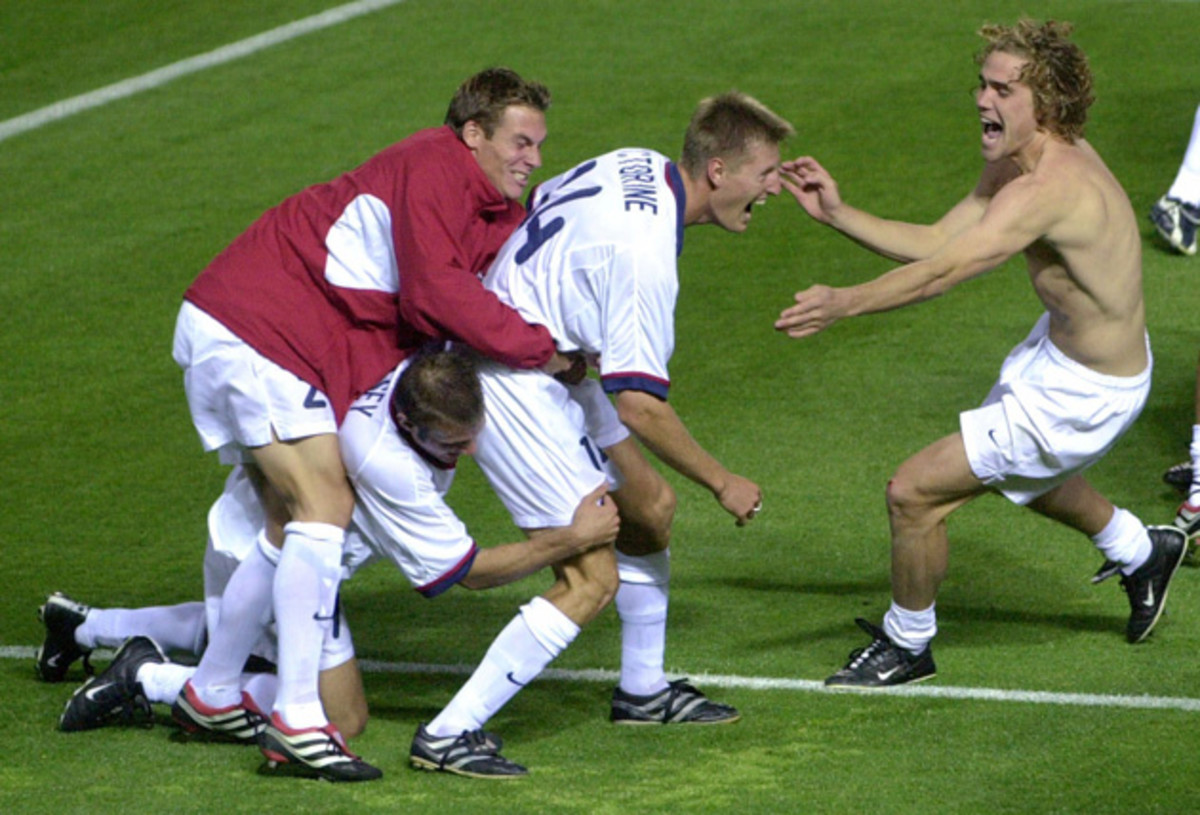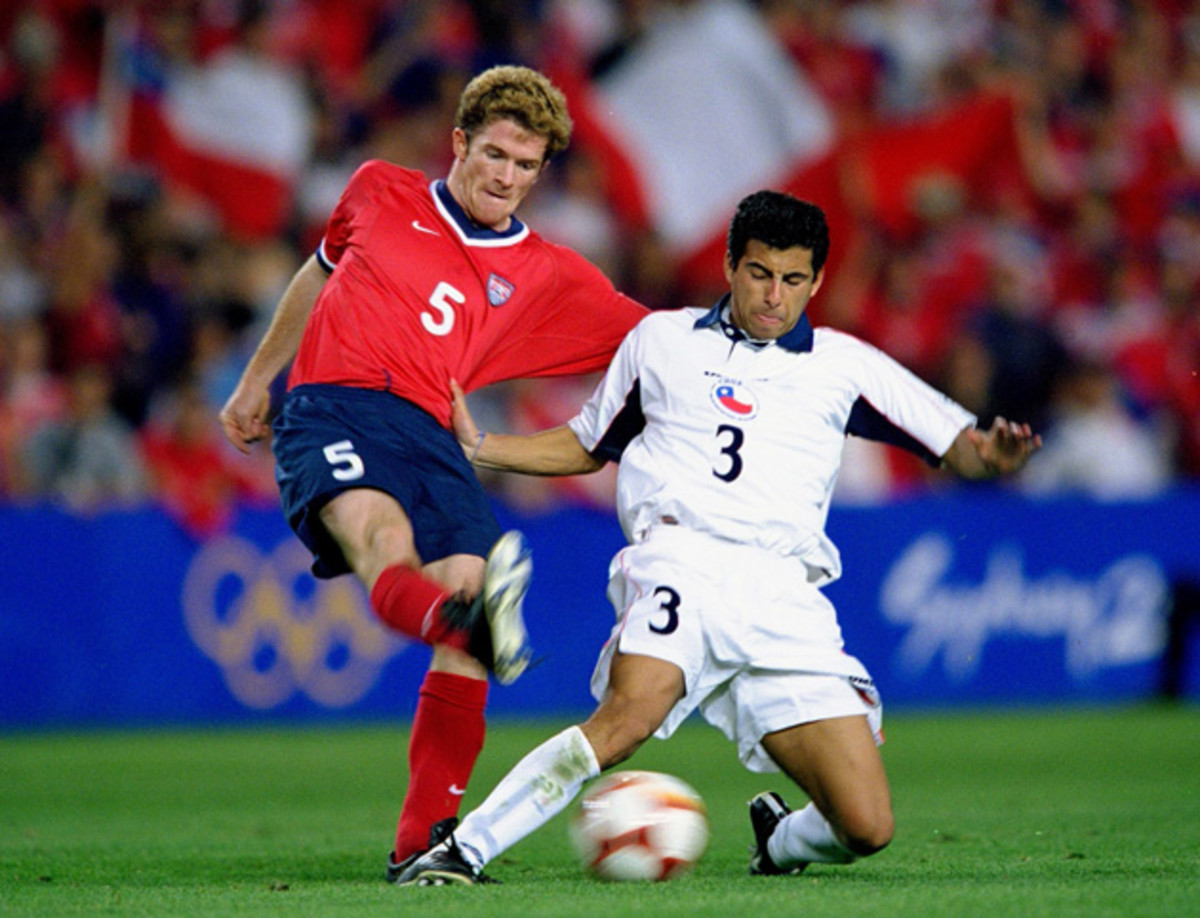USA's 2000 Olympians recall run to bronze-medal match

With the United States facing an uphill battle to qualify for just its second Olympics in four efforts, it’s sometimes hard to remember that at Sydney 2000, a group of greenhorn professionals finished in fourth place. They faced players such as Xavi, Carles Puyol, Samuel Eto’o, Iván Zamorano and Milan Baroš, and, though they managed only one win in the tournament, still made it to the bronze-medal match.
Looking at the U.S. squad led by legendary coach Clive Charles, it reads as a list of players who went on to play major roles for the senior team: John O’Brien, Ben Olsen, Josh Wolff, Chris Albright, Landon Donovan (the blonde edition) and Tim Howard were joined by over-age selections Brad Friedel, Jeff Agoos and Frankie Hejduk. DaMarcus Beasley narrowly missed the cut, remaining on the squad as an alternate.
“What a fantastic time for all of us involved—not only what we accomplished at the tournament and how well we did, but the … two-year process that went into that,” said Peter Vagenas, a rookie with the Los Angeles Galaxy at the time. “I think everyone would say Clive Charles was a pretty special man and, obviously, a pretty incredible coach. … I had a chance to play in midfield with John O’Brien, and we actually grew up playing in the same youth team, so it was fulfilling to me on a lot of fronts.”
U.S. U-23 team names roster for Olympic playoff vs. Colombia
Major League Soccer was just four years old at the time, yet only five players came from teams in other leagues.
With a league calendar less strenuous and a competition less organized than the current incarnation, the team was able to get together for long camps and cultivate a chemistry unlike most present-day national teams, even at the under-23 level.
“With all of those factors put together, it was a real recipe for success,” said Brian Dunseth, at the time the 23-year-old team captain who played with the New England Revolution.
Dunseth, Vagenas and Conor Casey spoke at length about Charles’ aura as coach and his ability to unite the group.
“[He was] able to be funny and keep you really comfortable, but at the same time, pushing you to want to be better and to, I don’t know if I’d say please him, but … he was a guy that was just very charismatic, and I think he was good at putting the right pieces together and forming a team,” said Casey, the only college player on the 2000 team who played for Charles at University of Portland.
The U.S. topped its group with just five points, a win and two draws, thanks to a goal difference just one notch superior to Cameroon’s. The group stage began with a 2-2 draw against the Czech Republic:
It was followed by a 1-1 result against Eto’o and his team:
And then a 3-1 win over Kuwait to seal a quarterfinal place against Japan:
“[It’s remarkable] how quickly the amazement of being in the Olympics disappears when you start playing,” Casey said. “We definitely performed as well as we could have performed against those kinds of players.”

After defeating Japan in penalties following another draw, the U.S. fell to a stacked Spanish side in the semifinals, 3-1. Xavi, 20, and Puyol, 22, headlined the squad, which made the final despite bringing no over-age players to the tournament, but the starting lineup also featured Carlos Marchena, David Albelda and José Mari. Joan Capdevila only made the bench, along with Gabri.
“Those rosters were littered with some of the biggest clubs in the world and players who were at the very beginning of their career, so it’s an interesting dynamic because some of those players ended up being some of the best players in the world,” said Vagenas, the U.S.’s leading goalscorer in the tournament with three. “For us, it was very important, because we did very well.”
After losing to Spain, the U.S. played Chile for third place and a bronze medal. The Americans held their opponents off for the first hour, and Dunseth smacked the crossbar with a shot in the 66th minute.
Three minutes later, “Bam Bam” Zamorano scored the first of his two goals in the game on a penalty after Danny Califf took down Sebastián González. Zamorano scored again in the 84th to seal a 2-0 result before swapping shirts with Dunseth, making his tournament debut due to a groin injury before the first game.
“We were playing a diamond [midfield] before it was relatively cool to play a diamond,” Dunseth said. “We just understood what our system was and what our identity was, and what our strengths and weaknesses were. … It led to kind of a perfect storm in terms of results, and if it wasn’t for that damn crossbar that I hit, we could have had a bronze.”

About the current team’s chances, the former Olympians were optimistic. The consensus was that it would be difficult to beat Colombia in a home-and-away playoff for the final spot at Rio 2016, but they said it would not be impossible.
Roundtable: Best, worst USA soccer uniforms of all time
“This group’s got real experience across the board,” said Vagenas, who is now the Galaxy's VP of soccer operations. “Do we have the talent to get it done? Absolutely.”
Dunseth, now a TV analyst, echoed U.S. technical director Jurgen Klinsmann’s consistent message that the Olympics are a massive development tool from which the U.S. has suffered from not taking advantage in, potentially, two consecutive cycles.
“We’ve lost out on what potentially could be three out of the last four Olympics since that bronze-medal-match run that could allow players to develop in a very similar dynamic as a World Cup,” Dunseth said. “The reality is, it has been a huge loss for U.S. Soccer to not be represented in the Olympics—to the individual players and to the collective development for the World Cup squad.”
The U.S.’s qualifying draw in 2000 was much kinder, as the Americans only needed to finish in the top two of a group containing Honduras and Canada before defeating Guatemala in the semifinals. At the same time, the U.S. can draw confidence from having seven players available that defeated Colombia in the 2015 U-20 World Cup.
“They have a great chance,” said Casey, who is in his 17th professional season and first with Columbus Crew SC. “It’s just about, on the day, getting a result.”
